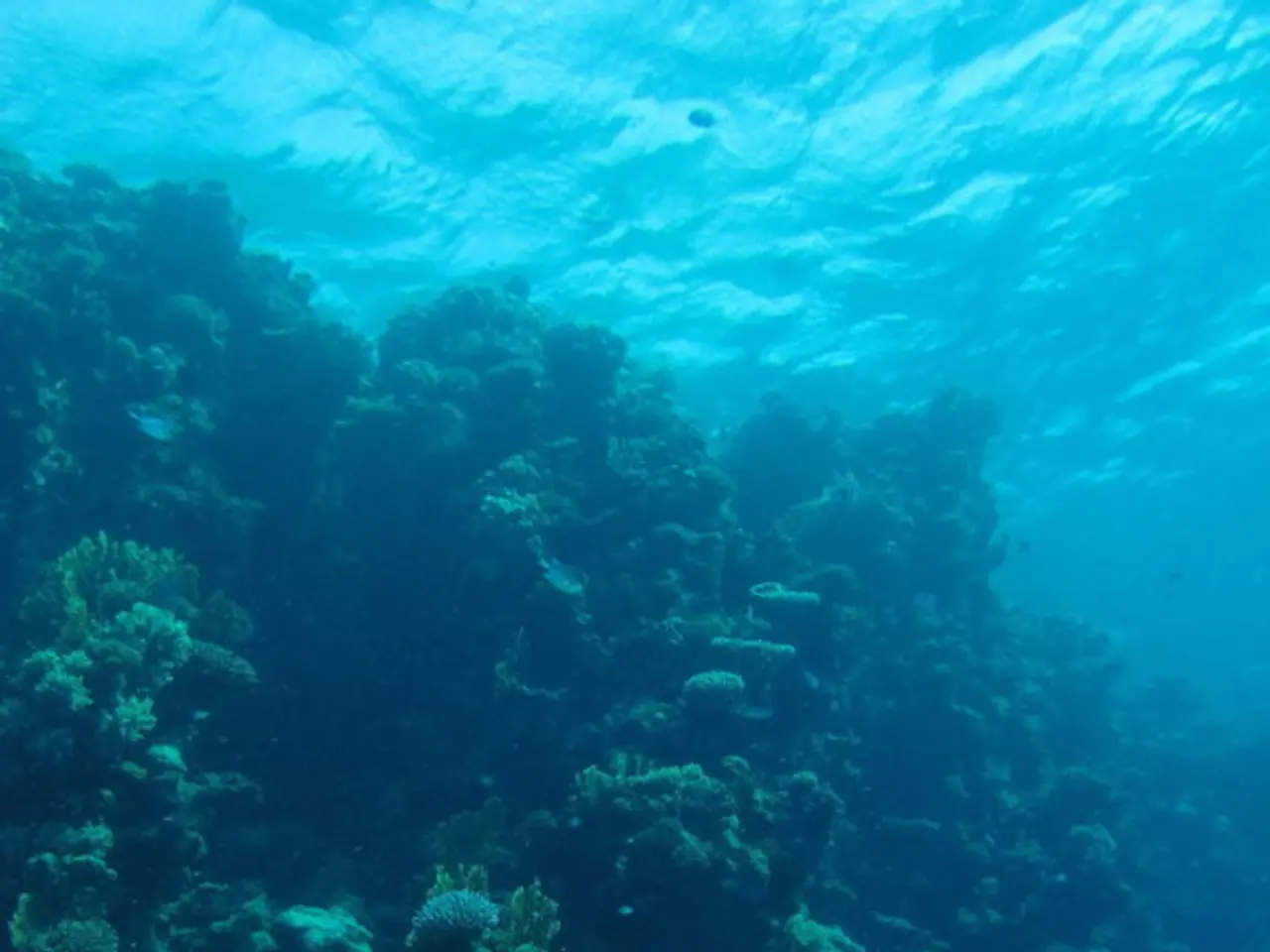Reason Exposed: Why Are the World's Oceans Becoming Darkened?
In a troubling development for marine ecosystems, new research indicates that over the past two decades, a significant portion of the global ocean has become darker. This phenomenon, primarily caused by increased concentrations of plankton, suspended particulate matter, and other optically active constituents, reduces the penetration of natural light into the ocean.
The darkening of the ocean means sunlight and moonlight penetrate less deeply, reducing the depth of the photic zone—the layer of ocean where enough light penetrates for photosynthesis to occur. This decrease in the photic zone depth is particularly concerning, as approximately 90% of all marine life, including plankton, fish, and other light-dependent organisms, live in this zone.
The potential impacts of ocean darkening on marine ecosystems and ocean health are significant. Reduced light availability limits photosynthesis by phytoplankton, which are critical for absorbing atmospheric CO2 and producing oxygen. This disruption can lead to less carbon sequestration, accelerating climate change, and decreasing oxygen production.
Moreover, less light impairs marine organisms’ ability to grow, move, hunt, communicate, and reproduce, forcing them into a smaller volume of habitable ocean and increasing competition for resources. This can disrupt marine food webs, alter species distributions, reduce biodiversity, and weaken the ocean's overall capacity to regulate climate and support marine life.
The most significant decreases in photic zone depth were observed at the top of the Gulf Stream and around both the Arctic and Antarctic. Coastal seas, being closest to human activity, are particularly vulnerable, and their resilience is crucial for both ecological health and human wellbeing. The North Sea and Celtic Sea, the eastern coasts of England and Scotland, the coastlines of Wales, and the northern elements of the Irish Sea have all become darker over the past two decades.
The shrinking photic zone represents one of the largest habitat losses on Earth over the last 20 years. Ocean darkening will eventually impact carbon storage, which would lead to worse climate change. The drivers of darkening change depend on the area. In coastal regions, increased biological activity can reduce light penetration, while in the open ocean, more frequent and intense algal blooms can deplete oxygen in the water.
Associate Professor of Marine Conservation at the University of Plymouth, Thomas Davies, stated that the darkening of the ocean reduces the amount of ocean available for animals that rely on the sun and the moon for their survival and reproduction. He further emphasised that this could intensify competition for resources, threaten marine ecosystems, and negatively impact oxygen production and the overall health of the ocean.
In summary, ocean darkening results from increased particulate and plankton concentrations limiting light penetration, driven by environmental changes including warming, and its consequences include jeopardizing photosynthesis, marine biodiversity, ecosystem stability, carbon storage, and ultimately climate regulation. It is crucial that we address this issue to preserve marine life and maintain the health of our oceans.
[1] Source: New research from the University of Plymouth found that between 2003 and 2022, 21% of the global ocean, including massive areas of coastal regions and open ocean, have become darker. More than 9% of the ocean, approximately 32 million square kilometres, have seen photic zone depths reduced by over 50 metres.
- The research from the University of Plymouth indicates that over the past two decades, a significant portion of the global ocean has darkened, mainly due to increased concentrations of plankton, suspended particulate matter, and other optically active constituents.
- This darkening of the ocean is particularly concerning as approximately 90% of marine life, including phytoplankton, fish, and other light-dependent organisms, live in the photic zone, the layer where enough light penetrates for photosynthesis to occur.
- The decreased photic zone depth, caused by the darkening, could lead to less carbon sequestration and decreased oxygen production, potentially accelerating climate change.
- The shrinking photic zone, driven by climate change and environmental factors, also affects marine organisms’ ability to grow, move, hunt, communicate, and reproduce, forcing them into a smaller volume of habitable ocean and increasing competition for resources.
- The North Sea, Celtic Sea, the eastern coasts of England and Scotland, the coastlines of Wales, and the northern elements of the Irish Sea are among the coastal seas that have become darker over the past two decades.
- The darkening of the ocean and the resulting shrinkage of the photic zone represent one of the largest habitat losses on Earth over the last 20 years, with potential impacts on carbon storage, marine biodiversity, ecosystem stability, climate regulation, and ultimately, human health and wellness.




